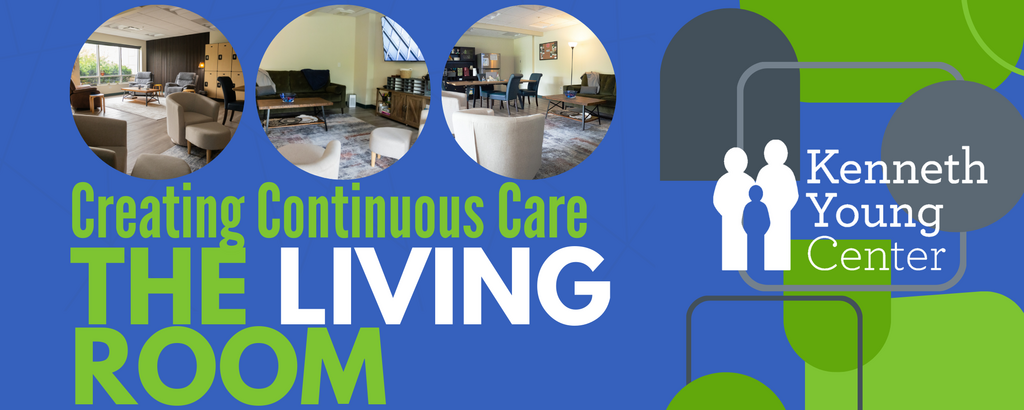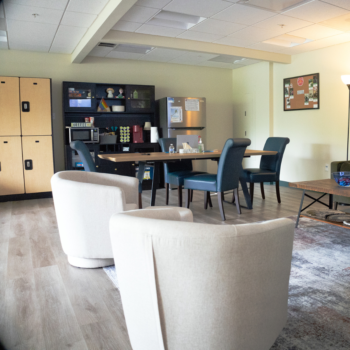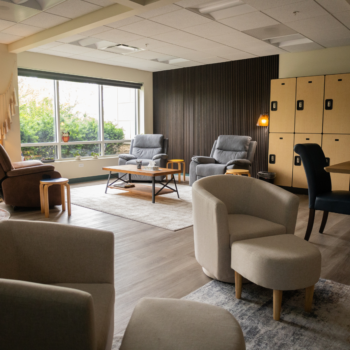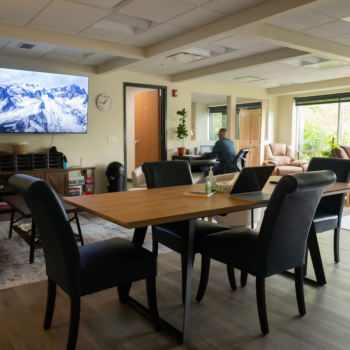
Creating Continuous Care — KYC’s Living Room
Dignified Diversion

No one should have to face a mental health crisis alone. Kenneth Young Center’s Living Room program provides a safe and compassionate alternative to emergency room care to people facing some of their steepest challenges.
“Living Room Programming is meant to be a part of the crisis care continuum in Illinois. The function of this continuum is to take unnecessary hospitalizations out of the equation,” Living Room Manager, Jacob Story, explains. Expanding the crisis response coverage in areas all throughout Illinois by creating Living Room spaces is just one of the methods in breaking the crisis hospitalization cycle. Living Rooms establish reliable and safe community support during crisis.
Jacob highlights that a crisis could involve suicidal ideation, but that is not always the case. A crisis could be big feelings of overwhelm that require additional support in regulating. The Living Room is available and open 24⁄7 to those 18 years old and above who are seeking support. There is no cost to visit the Living Room, which is open to all community members, regardless of health care coverage status. Anyone seeking care can visit this brave space to talk with a highly-trained Recovery Support Specialist who has real world recovery and mental health lived experiences. Jacob expands on The Recovery Support Specialist’s role, describing, “[people who] either come out of the recovery community or are in their own stage of recovery. Lived experience is important for the people we hire.” The aim is to ensure that people in crisis speak to someone who has been through similar experiences in their own lives.”
This real-world experience allows the staff in the Living Room the ability to meet clients where they are at. Skilled in empathy-work and de-escalation, Recovery Support Specialists connect with guests of the Living Room, allowing them the space to feel both heard and understood. Using the model of harm-reduction, the Living Room is a voluntary walk-in space where those in crisis focus on peer support with trained professionals. However, there are higher levels of safeguards built into this programming as well, including: suicide risk assessments, safety planning, and access to a Qualified Mental Health Professional when additional support is needed. The team at the Living Room is also equipped to support planning for those who still require or are interested in seeking hospitalization after their immediate crisis has resolved. The Living Room is meant to be a space where individuals can talk with a professional to evaluate all of their options and provides them with the space to make decisions and plan for what to do next.
Making an Impact

Jacob recounts the success story of one guest who visited the Living Room. “When they first came in, they described their previous experiences [attempting to access care through other avenues] as, ‘I’ve been to this place, and they got rid of me. I went to that place, and they told me they can’t do anything for me.’ It was a series of experiences where they weren’t getting what they needed. One of the first things we did was say ‘we will stick with you as we work through this together.’” This reassurance was exactly what the guest needed to hear in order to keep working towards their goals.
The Living Room team connected this community member with a full suite of wraparound services like other therapies, groups, and services offered by Kenneth Young Center. Jacob continues, “generally for people in crisis, the feelings are intense. They come off sounding angry or dismissive or annoyed and it’s very easy for folks to write them off in return.” The willingness of this Living Room team to fully support and engage with this guest provided an avenue to accessing care they hadn’t previously gotten, which now allows them to thrive.
Jacob relays that this is in large credit to both the guest and the Living Room staff. He continues, “oftentimes those in crisis are asked to do much more than they’re able to do and much more than an individual who is not in crisis could do.” Asking someone to research mental health care providers in their area, confirm they accept their health care coverage, schedule an initial appointment, and follow through on that commitment on a short timeline is a sizeable task for anyone, let alone compounding these tasks with simultaneously locating other critical resources from reputable sources all at once. “Our staff are able to see that and react in a way that is not disconnecting or doesn’t put up barriers inadvertently.”
Excited about the future of the Living Room and the supportive care they are providing the community, Jacob shares “I feel like we have just a really interesting group and mix of experiences on the team and it really adds to our abilities. I can’t say it enough, how awesome it is to work with a team of people who are as dedicated to something like this as they are. It’s not just a job for a lot of them, but a passion and career, and it is exciting to watch that.”
Support is always available

Whatever you need, there is help available to you. Whether you’re seeking care for yourself or someone you care about, our team is available to provide immediate support, respite, and resources to address mental health concerns, social work interventions, and behavioral health crisis.
Visit KYC’s Living Room in-person: 1585 West Dempster Street, Mount Prospect, IL 60056
Connect with KYC’s Crisis Team: over the phone or receive an in-person response any time: dial 847−383−0406
Speak with someone 24 hours a day from anywhere in the U.S.: dial 988
If you or someone you know is experiencing a life-threatening emergency, please dial 911.
Previous Article Next Article

